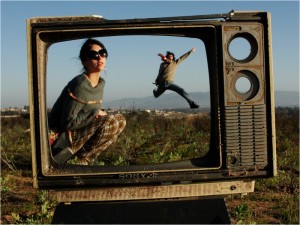Editor’s note: Jeremy Toeman is a founder of Dijit Media, a startup whose vision is to create the ultimate “hyperpersonalised social TV guide” mobile experience. Jeremy has over 11 years experience in the convergence of digital media, mobile entertainment, social entertainment, social TV and consumer technology working with companies like Sling Media, Mediabolic, Boxee, Clicker, VUDU, and more. Follow him on Twitter @jtoeman.
Escape.
Yes, that’s it, escape, that’s whole secret right there. Some say “entertainment” but I believe that is merely a subset of escape, as an experience. And to be clear, I do agree that people choose to watch television as a form of entertainment. But when you consider a “typical” 4+ hour session of watching TV in a “typical” North American household, I think it’s a little beyond being entertained.
Why are reality shows so popular? Especially the trainwreck ones? You escape your life to watch someone else’s – oh, and the other person seems to be fighting more than you, more likely to end up in jail than you, and you are certainly, definitely, positively never ever going to get voted off some island. Escape!
Swing around to the other end of the spectrum, shows like Planet Earth on Discovery. You escape by watching hours of beautiful scenery and animals floating by. Plus the occasional alligator eating anything it wants doesn’t hurt either. It’s dreamlike in a way. Escape!
Now on to technology and the race to the “future of TV.” So far, the future bodes… poorly. Based on the three key pillars of the future of TV, as we define it today:
Smart TVs: Rather than turning on TVs and escaping into the programming, Smart TVs take time to boot up, then let users escape into the menus. Where they navigate and navigate and navigate to find some piece of content they want. And then they do it again, and again, and again. It’s interruptive, frustrating, and far from escape (in a word: sucky). And hence will have to evolve (or more hopefully in my opinion, devolve) into less “smart” and more “simply connected” TVs.
Social TV: Instead of letting users escape into their shows, Social TV mandates that users “pay attention” to Twitter, Facebook, or some dedicated wonderful app, all for the benefit of chatter with other users. While this certainly does contribute to the social connection factor, which is a key attribute of the overall TV content lifecycle, it’s hard to see how this becomes sticky in the long run. Social TV needs to put less demands on a “real time” interaction, and instead find ways to create community, conversation, and discovery in a more passive, asynchronous fashion.
Second Screen: Thanks to second screen apps, instead of escaping away from interactivity, users can, in some way, play along with the show they are watching. I’m as much of an IMDB/Wikipedia nut as they come (then again, I’ve been known to watch DVDs while listening to the director’s commentary tracks), but even I don’t feel the need to know who every actor is, what other parts they’ve played, and what other nuance about each and every scene happened. And I certainly don’t think it needs to happen while I’m watching. Yes, I like many others pull out a second screen device (hint: iPad) frequently while watching TV. And just like many others, I’m using it to play Draw Something (another form of escape), not read obscure trivia (effort/work). The moment someone pulls out their phone or iPad to “interact with” the show they are watching, they stop watching the show.
My newest golden rule of creating TV technology and experiences is this: If the product doesn’t take “escape” into account in a major way, it is utterly doomed to fail.
So to TV, device, service, and app makers – think about how people really do watch TV. They aren’t changing, no matter how much you try to force it down their throats. Yes, you can get some limited adoption, and hopefully that’ll be enough to build a business around. But more likely is it’ll be a novelty, gimmick, or fad, and won’t last as many seasons as Fletch’s amazingly disappointing talk show.
